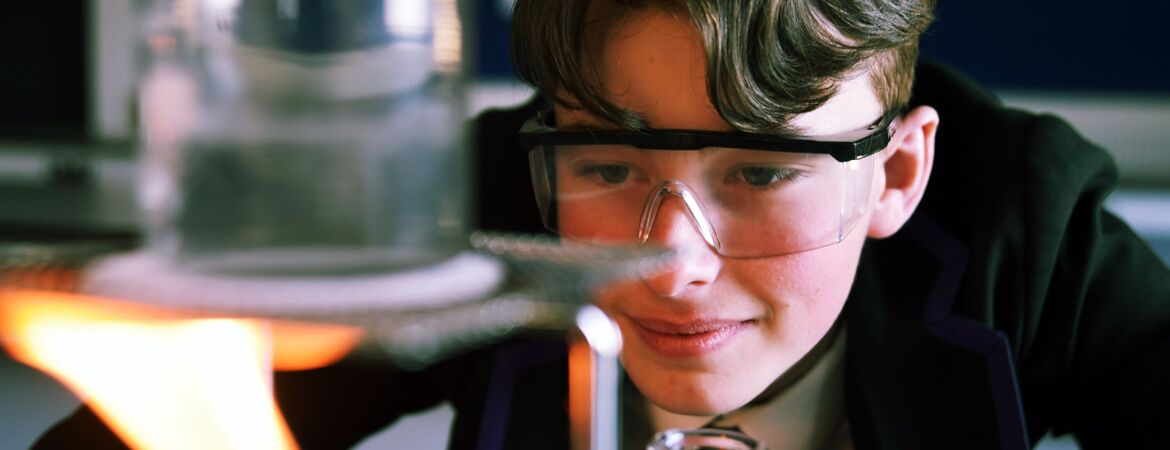Science
At Trinity a high-quality science education provides the foundations for understanding the world through the specific disciplines of Biology, Chemistry and Physics. Science has changed our lives and is vital to the world’s future prosperity, we believe all pupils should be taught essential aspects of the knowledge, methods, processes and uses of science. Through building up a body of key foundational knowledge and concepts, pupils should be encouraged to recognise the power of rational explanation and develop a sense of excitement and curiosity about natural phenomena. They should be encouraged to understand how science can be used to explain what is occurring, predict how things will behave, and analyse causes.
With inquiry at the core, the science curriculum at Trinity aims to guide students to independently and collaboratively investigate issues through research, observation and experimentation by developing critical working scientifically skills. The science curriculum explores the connections between science and everyday life. As students investigate real examples of science applications, students will discover the tensions and dependencies between science and other factors, including morality, ethics, and the environment. Scientific inquiry also fosters critical and creative thinking about research and design, as well as the identification of assumptions and alternative explanations.
In Key Stage 3, there are ten key concepts that underpin all topics taught. These are: Forces; Electromagnets; Energy; Waves; Matter; Reactions; Earth; Organisms; Ecosystems; and Genes. Students will continue to revisit these key concepts as it supports students develop an understanding of a big picture ideas by multiple interactions with the concepts within the idea. By connecting smaller ideas to more abstract ideas, students will be better prepared to apply these concepts when approaching an unfamiliar topic.
By the end of Year 9, students have developed a deeper understanding of a range of scientific ideas in the three science subject disciplines, Biology, Chemistry and Physics. Students have begun to see the connections between these subject areas and they are aware of the big ideas underpinning scientific knowledge and understanding. A spiral approach is adopted where students build upon the concepts taught in Year 7, ensuring that subject knowledge is revisited through the use of big ideas and mastery goals. The complexity increases each time content is revisited.
By the end of Year 11, students have continued the process of building upon and deepening their scientific knowledge. They are equipped with the knowledge required to understand the uses and implications of science, today and for the future. Students are familiar with, and use, technical terminology accurately and precisely, having built up an extended specialist vocabulary. They also apply their mathematical knowledge to their understanding of science, including collecting, presenting and analysing data. At the end of Year 11, students may go on to study science in the Sixth form. Students who do not pursue a science-related course will still be science-literate and prepared for life outside of school.
Students have the opportunity to take A Levels in Biology, Chemistry and Physics in Sixth Form. Many students who take a Science A Level show real passion for the subject and they are looking to develop an interest in further study and careers associated with Science. During the course, students will continue to gain essential knowledge and an understanding of how different areas link together, while achieving a deep appreciation of the skills, knowledge and understanding of scientific methods. Students will also develop their competence and confidence in a variety of practical, mathematical and problem-solving skills.
SEND and Science at Trinity
At Trinity it is an expectation that all lessons and wider resourcing has effective provision for students with SEND so that they are able to make equal progress to their peers. SEND data is analysed and used to inform planning and interventions where necessary.
At Trinity It is an expectation that all lessons and wider resourcing has effective provision for students with SEND so that they are able to make equal progress to their peers. SEND data is analysed and used to inform planning and interventions where necessary.
In science all teachers consider the needs of SEND students in three ways.
Firstly, teachers consider a ‘seating check’. This means that the needs of all students have been considered when assigning a seating location in the room to maximise all student outcomes and promote positive behaviour for learning.
Secondly, all resources are checked to ensure they are SEND friendly. In science this means that information is presented in a clear and concise manner with dual-coding, and a coloured background to the teaching slides. Lessons follow a consistent structure where knowledge retrieval starter activities take place at the beginning of lessons to consolidate prior learning and allow connections to be made between topics for students to see the bigger picture.
Finally, the way science is implemented is at Trinity ensures all SEND students can make progress. In KS3, key concepts are introduced to students and revisited as part of a spiral curriculum, with topic recap lessons taking place before building upon a previous topic; additionally, there are revision lessons incorporated into the programme of study to support students with their consolidation of knowledge. In Year 9, students receive a course companion workbook to support them in their learning which contains knowledge organisers, knowledge retrieval questions and exam-style questions to practise. Homework is based on consolidation of knowledge where students regularly complete knowledge retrieval questions.


